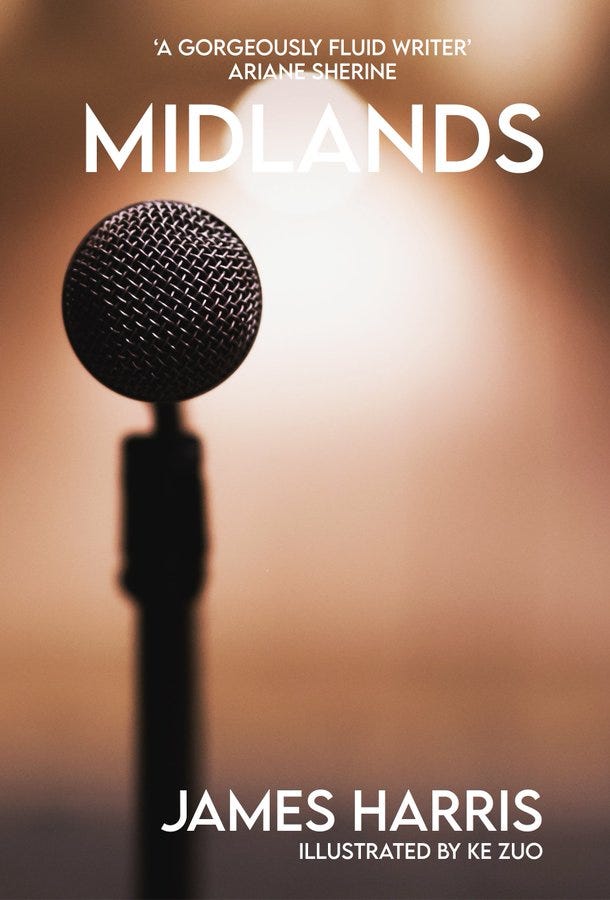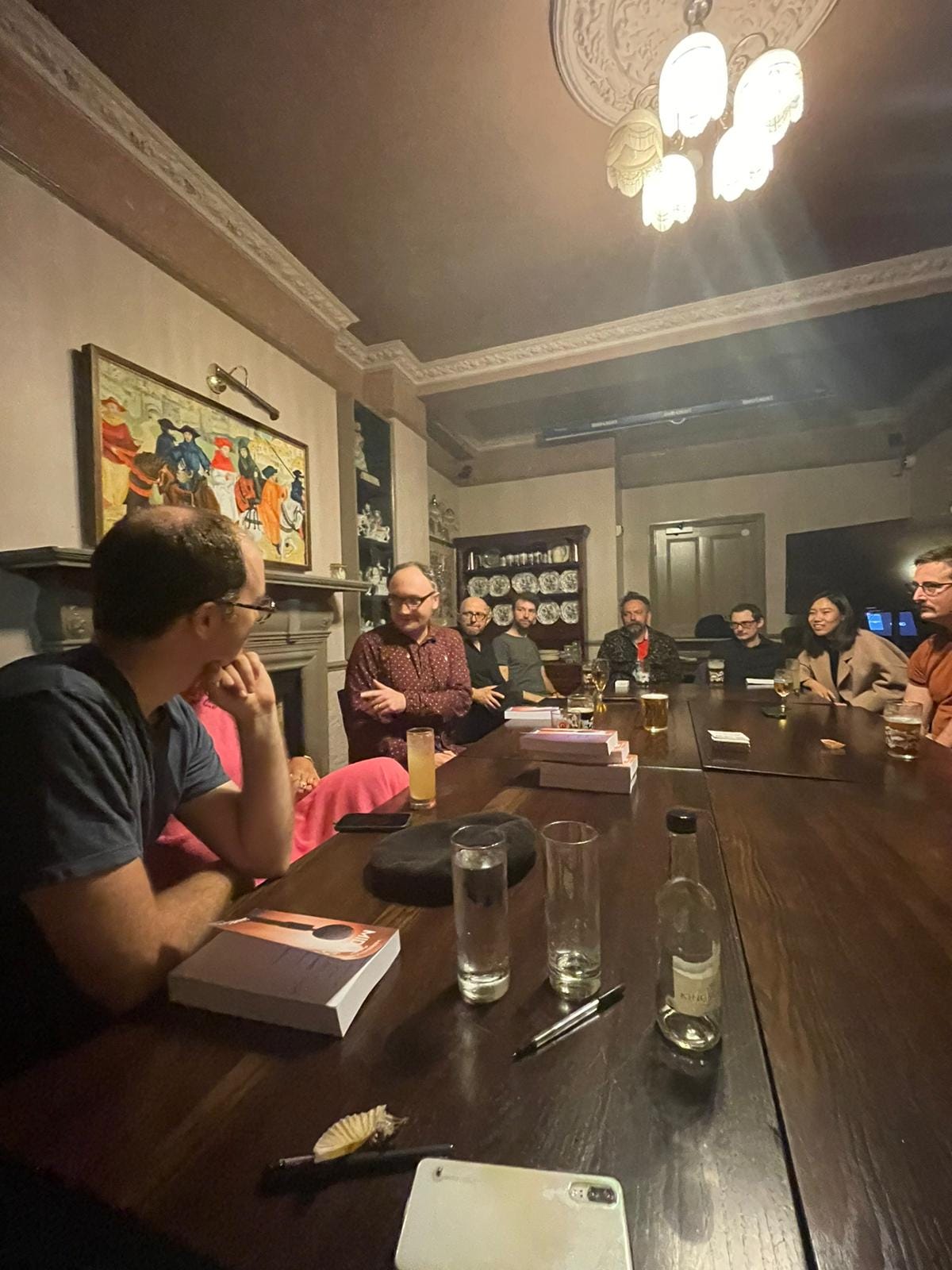A year ago I self-published my first novel, ‘Midlands’. This week, I’d like to take a moment to reflect on that process and what I’ve learnt from it.

This newsletter has been the most successful writing project I’ve ever embarked on; over the writing of just under 100 posts, I’ve gained just under 1000 regular subscribers. So ten subscribers per post and some of you – to whom I am deeply grateful – even pay for the privilege. The encouragement this readership provides saw me to decide to self-publish my novel ‘Midlands’ exactly a year ago, on the day of Boris Johnson’s resignation to be precise. I can claim no synchronicity there, save for the launch itself being somewhat overshadowed.
The product of a decade’s work, ‘Midlands’ tells the semi-autobiographical tale of two comedians touring Germany in the early 2010s coupled with a love story about the leaving of Berlin. I used to jokingly describe it as ‘a Bildungsroman where nobody learns anything’. You can read its preface here.
As of today, I’ve sold 160 copies, which I absolutely count as a modest success. Indeed, it overlaps with theories of audience building, where you can reckon with a smaller part of your larger audience being prepared support you financially, often estimated at about 1-5%.
That checks out against the 1000 newsletter subscribers I spoke of earlier, although obviously not all those sales have come via Substack. I’ve also found Twitter, coupling promotional Tweets with the use of small videos, useful for shifting books. The book sales themselves have come exclusively via Amazon, which some readers have demurred over. Though I respect their concerns, the issue is as an indie writer that I’ve found no other platform able to give author’s a comparatively good deal or ease of interface.
Overall the aim is, as a friend of mine with digital marketing expertise said, to get all your horses pulling in one direction. As I produce content across various platforms, my newsletter plugs my book and my Twitter plugs my newsletter – although that has been somewhat curtailed of late by somewhat wavering commitment of Elon Musk to the ‘digital town square’ in cordoning off its Substack antechamber.
160 sales isn’t a lot, but it’s also inherently hard to sell books. A small run with a prestigious indie press might be 500 books; even at the traditional houses, very celebrated literary writers like Cormac McCarthy sold in the low thousands until well into their career.
Meaning, entirely off my own bat, I’m close to the amount of sales I’d see in an indie-publishing framework. I should emphasize I’ve had no press interest or PR support whatsoever; it’s all been word-of-mouth and personal connections. I’m sure many of my readers have bought the book just to support their concept of ‘me’.
I did host a small launch of the book this October. It was a really great night where I read some favourite extracts from the piece, sold all my physical copies, and also learned the highly necessary indiepreneur skill of using a card-reader.
I also said that I’d give free copies of the book away to those who take out an annual paid subscription to this newsletter. I wouldn’t recommend this as a financial strategy though, as sending out the books costs significant money, and writing this newsletter is already labour-intensive enough. In the meantime, the offer still stands, and please do chase me if you haven’t had your book yet; for UK monthly subscriptions, I can send you it via Kindle too.
Overall the book has made me about £150. That’s obviously absolute peanuts – less than selling one op-ed piece – but still, it’s £150 the manuscript couldn’t have earnt just sitting in a drawer. There’s some sort of special charm to money you’ve earned doing something you love, too, and I view my fiction as the most precious part of my writing, even if it attracts less attention than the topical pieces I write.
Besides, I set the price very low too, at just £1 on Kindle and free on Kindle Unlimited; for me getting people to read it and acknowledge my self-evident qualities was more important than a few quid here or there.
I also note that you can now pick the book up as ‘used’ on Amazon for £2.04. What better sign of success is there for a writer than to be available secondhand?

Now let’s move away from the practicalities and talk more about some of the emotional experience of putting your book out there yourself.
Here a question returns to me: Was I right to self-publish in the first place?
After all, ‘Midlands’ was a book which was roundly rejected by the UK publishing industry, with close to 100 refusals across agents and publishers. ‘Roundly rejected’, in fact, suggests a level of engagement with the book far in excess of what existed; across those 100 rejections, the sum total of personal responses was two. One agent said there was ‘much to admire’ about the sample chapters but it was not for them and another, sharing their thoughts on the nature of comedy, said ‘One man’s giggle is another man’s groan’, to which I replied that there were some things which seemed to be universally funny, such as farting.
In terms of industry feedback, that was that.
Rightly or wrongly, I chose to interpret these rejections as a response to publishing people encountering something they saw as uncommercial rather than any verdict on the merits of the work. Of course, something can be uncommercial and good; something uncommercial can even be over the long run commercial. Yet in the act of putting something out there myself, I am saying that I think I knew better than these people.
Here’s the thing: I do think I know better than this people. I certainly know my own writing better. And I suspect most readers can intuit that this is a funny time for publishing and indeed, a funny time for the arts generally in terms of what’s getting made.
Publishing is also the slowest and most inaccessible industry I have ever encountered.
I’ve been trying to break into it for years, with an endlessly positive attitude, but now just feel that my concerns – humour, masculinity, European culture and languages – are ones the industry has decided there aren’t readers for. And yes, let’s undramatically acknowledge, as people working within the industry themselves do, that certain kinds of authorial identities are more in fashion than others, and straight white (bit Jewish, bit bisexual) comic writers are not one of them.
I personally feel that even if I could write things more in line with publishing expectations, either indie or mainstream, they’d still be rejected, locking me in a state of permanent frustration which is certainly personally unhealthy. I can cope with everything but wasting time.
Besides - and here I must thank the many writing friends who offered advice on the manuscript over the years - ‘Midlands’ had arrived at a stage where I considered it complete. And though there was no official channel to present it to the world, there was now an audience.
A writer can do anything, I think, if they have an audience. An audience is power. An audience is encouragement; whatever gatekeepers are telling you, or not, there is interest in your work.

It doesn’t take much to encourage me either and even after the very minor success of ‘Midlands’, I’ve already got another novel in a draft manuscript. I wrote it last summer and am planning to rework it this. Once it’s ready, I’ll try the traditional publishing route first. I do think it’s a more commercial book than ‘Midlands’, and will try and get an agent attached but still – if all else fails, I’ll just put it out there myself.
I’ve already seen that readers have fewer qualms and hang-ups about the editorial provenance of where what they read come from. They just want good reads. Ironically, the more cautious and squarely allied to identity politics the publishing industry grows, the more self-publishing loses its stigma. Indeed, it may be the case that there is already more of an audience via the fiction-newsletter axis than much of traditional publishing can offer; certainly, a lot of the best, certainly the freest writing is now going on on new media.
I’m under no illusions that the novel I put out there is without flaws; it is visibly the work of a much younger author. I’ve improved as a writer since then not least because of the weekly literary workout of writing this newsletter. At the same time I’m also a writer no longer capable of writing that particular book, no longer possessing either the exuberance or bitterness of youth.
My ultimate choice was whether to leave the book on my hard drive or put it out there and in that binary I think I made the correct decision. Further revision was not an option; the book would only have got worse, or less what I wanted to say.
Overall, putting ‘Midlands’ out in the world and getting it read by other people has been the most positive thing I’ve done for my mental health in years. I feel like a proper writer! After all, all the positive aspects of writing and publishing still exist in a self-publishing context; interacting with readers about your work, discussing its themes, even signing books.
Plus you still get reviews and with them feedback; if you’ve read ‘Midlands’ and would like to add one, please do, for nothing helps get the word about my book out there more. I’m told even negative ones help.
In short, you can have all the writing good stuff via self-publishing as soon as your ego accepts that you’re just going to have to be your own cheerleader, and can accommodate to the inherent loneliness of that.
So that’s my advice. If you have a manuscript you consider complete in your drawer and, crucially, you have a potential audience for it, stuff the gatekeepers and put it out yourself. Give your book the chance to make its way in the world.
My novel, ‘Midlands’, is available now from Amazon for Kindle and paperback.




Happy 1yr anniversary! 🥰
Good piece, James. Lots to enjoy, both in this and in ‘Midlands.’ Surely your readers aren’t the only people interested in the themes you address: humour, masculinity, Europe, language(s)? The politics of all four themes seem to be in pretty constant discussion on social media. Add friendship to that, too, with its echoes of Withnail.
I think it’s great that self-publishing has allowed you to get your book ‘out there.’ Let’s hope your second novel builds on ‘Midlands’’ success, perhaps even sparking new interest in it.